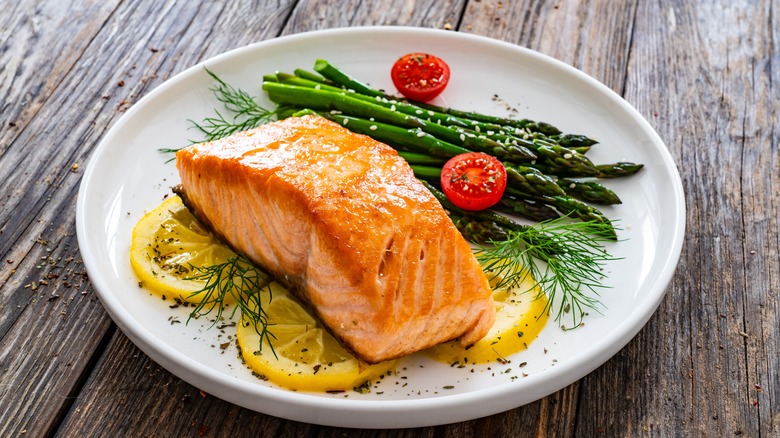This High-Protein Snack Can Also Help Your Heart Health
Heart disease continues to be the number one cause of death, according to the U.S. Centers for Disease Control and Prevention. High blood pressure, high cholesterol, obesity, and type 2 diabetes are just some of the conditions that can lead to heart disease. Your diet can play a key role in keeping your heart healthy if you choose fruits, leafy greens, whole grains, and low-fat dairy in your daily menus. You'll also want to choose foods with unsaturated fats because they're high in omega-3 fatty acids.
A protein-rich food that also has heart-healthy omega-3s is salmon. These days you can find canned salmon next to the canned tuna in your grocery store. A 3-ounce serving of canned salmon is just 142 calories and has a whopping 20 grams of protein. You'll also get almost 80% of the recommended amount of omega-3s without adding too much artery-clogging saturated fat. Vitamin D is also good for your heart, but you don't need a vitamin D supplement if you eat salmon every day. Salmon provides almost all of your daily supply of vitamin D. Salmon can improve your heart health by lowering your blood pressure, reducing cholesterol, and improving fat metabolism.
Salmon better for heart than fish oil supplement
You could easily get your omega-3s from a fish oil supplement, but a 4-ounce serving of salmon can serve as a great snack to fill you up and take care of your heart. In a 2007 study in Atherosclerosis, 48 healthy men ate about 4 ounces of salmon every day for four weeks. Eating salmon lowered their blood pressure by 4%, triglycerides by 15%, and LDL cholesterol by 7%. HDL cholesterol helps to clear cholesterol from your blood, and eating salmon can increase your HDL cholesterol by 5%. The researchers concluded that eating salmon every day reduced the risk of heart disease by 25%.
Eating salmon might also be better than a fish oil supplement for your fat metabolism, according to a 2013 study in Metabolism. This study had 29 overweight people get 1.8 grams of omega-3 fatty acids from either fish or a fish oil supplement. You can get 1.7 grams of omega-3 from 4 ounces of canned salmon. After four weeks, the people who ate fish had an increase in adiponectin, which is a hormone that improves insulin sensitivity and increases fat metabolism.
Some risks of eating salmon
Getting your daily omega-3s from salmon does have a few considerations. Farm-raised salmon could have up to 15 times more polychlorinated biphenyl (PCB) than wild salmon (per WebMD). PCBs are pollutants that can raise your risk of obesity, type 2 diabetes, and stroke. On the other hand, heavy pollution can contaminate the water in which wild salmon is fished. Most canned salmon is wild-caught, but the product label should indicate how the salmon is sourced.
Although the American Heart Association recommends eating at least two servings of fatty fish such as salmon every week, some health experts say it's safe to eat fish daily. "It's certainly better to eat fish every day than to eat beef every day," Professor of Epidemiology at Harvard School of Public Health Eric Rimm told Today. People might fear high levels of mercury in fish, but canned salmon has some of the lowest levels of mercury, according to the U.S. Food & Drug Administration. Mercury in food can affect the neurological development of fetuses and small children. Pregnant women and young children should avoid fish such as swordfish, tuna, and orange roughy because of their high levels of mercury.


